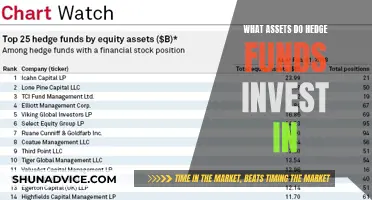
Mutual funds are a popular investment vehicle, especially for retirement accounts like 401(k)s. They are a relatively hands-off way to invest in many different assets at once, providing instant diversification. They are also highly liquid, meaning they are easy to buy or sell.
Mutual funds pool money from multiple investors to purchase a diversified portfolio of stocks, bonds, or other securities. This allows individual investors to gain exposure to a professionally managed portfolio and potentially benefit from economies of scale, while also spreading risk across multiple investments.
Mutual funds are subject to industry regulations and offer clear investment objectives. They are known for their minimal investment requirements, professional management, and variety of offerings. However, they also come with high fees, commissions, and other expenses that can impact overall returns.
| Characteristics | Values |
|---|---|
| Investment vehicle | Pooled investment vehicle |
| Investment type | Low-risk |
| Investment objective | Safety of capital, high income, moderate capital appreciation, fast growth |
| Investment strategy | Diversified portfolio of stocks, bonds, or other securities |
| Accessibility | Accessible way for investors to access a wide mix of assets |
| Affordability | Low minimum investment requirements |
| Liquidity | Highly liquid |
| Risk | Low risk, spreading risk across multiple investments |
| Returns | Positive returns, higher long-term returns |
| Management | Professionally managed |
| Taxes | Tax advantages |
What You'll Learn

Instant diversification
A mutual fund is a type of investment vehicle, which is any method by which individuals or businesses can invest and grow their money. Investment vehicles can be low-risk, such as certificates of deposit or bonds, or carry more risk, such as stocks, options, and futures. Mutual funds are considered pooled investment vehicles, where multiple investors pool their money to gain advantages they wouldn't have as individual investors.
Mutual funds are an attractive option for investors who don't want to pick and choose individual investments but still want to benefit from the stock market's high average annual returns. They are a relatively hands-off way to invest in many different assets at once. With a mutual fund, you could gain exposure to hundreds of stocks, bonds, or other investments within a single fund. This makes mutual funds a popular choice for retirement accounts like 401(k)s.
Mutual funds also provide instant diversification by giving investors access to a wide range of asset classes. For example, investors can gain exposure to foreign equities or exotic commodities, which would be difficult to access as individual investors. Mutual funds enable investors to take advantage of dollar-cost averaging, which involves investing a set amount periodically, regardless of market changes.
While diversification helps reduce risk, it's important to note that it does not insulate you completely from market movements. However, it can help soften the impact of wide price swings that may affect individual securities.
Aquabounty's Mutual Fund Investors: Who's Taking the Plunge?
You may want to see also

Professional management
Mutual funds are managed by professional money managers who trade on exchanges to provide investors with access to a wide mix of assets. These managers use research and skillful trading to make and monitor investments.
Mutual funds are a relatively inexpensive way for small investors to benefit from full-time, professional money management. They require much lower investment minimums, which means that individual investors can access professional money management at a low cost.
Mutual funds are subject to industry regulations that ensure accountability and fairness for investors. The component securities of each mutual fund can be found across many platforms, and investors can research and choose from funds with different management styles and goals.
A mutual fund manager may focus on value investing, growth investing, developed markets, emerging markets, income, or macroeconomic investing, among many other styles. This variety enables investors to gain exposure not only to stocks and bonds but also to commodities, foreign assets, and real estate through specialised mutual funds. Mutual funds provide prospects for foreign and domestic investment that might otherwise be inaccessible.
Mutual fund managers are legally obligated to follow the fund's stated mandate and to work in the best interest of mutual fund shareholders.
Mutual Fund Tax Strategies: Secrets to Tax-Free Investing
You may want to see also

Low minimum investment
Mutual funds are a smart investment vehicle because they offer minimal investment requirements, allowing investors to buy into a lot of funds with an initial investment of $500 to $1,000. In fact, minimums lower than $500 are rare. Once you become a shareholder, most funds will also allow you to invest smaller amounts.
The low minimum investment requirements of mutual funds make them an accessible way for individual investors to gain exposure to a professionally managed portfolio of diversified investments. This is especially beneficial for investors who don't want to pick and choose individual investments themselves but want to benefit from the stock market's historically high average annual returns.
Mutual funds are also a good option for investors who want to benefit from compound interest and grow their money over time with a long-term investment.
Best Banks for Investment: Where to Invest Your Money?
You may want to see also

Passive investing
Benefits of Passive Investing
- Lower maintenance: Passive investing doesn't require constant tracking of performance.
- Steady returns: Passive funds tend to outperform active funds in the long term.
- Lower fees: Passive investing doesn't require as much buying and selling, leading to lower expense ratios.
- Lower capital gains taxes: Passive investors hold assets long-term, reducing taxes.
- Lower risk: Passive investing is less risky because it involves investing in a broad mix of asset classes and industries, rather than individual stocks.
Drawbacks of Passive Investing
- Limited investment options: Passive investors can't handpick each investment.
- May not get above-market returns: Passive funds rarely beat the market.
- Reliance on others: Passive investors rely on fund managers to make decisions.
Mutual Fund Investment: Smart Money Moves to Make Now
You may want to see also

Tax advantages
Mutual funds are a popular investment vehicle, especially for retirement accounts such as 401(k)s. They are a relatively hands-off way to invest in many different assets at once, providing instant diversification. They are also highly liquid, making them easy to buy and sell.
Mutual funds offer several tax advantages, which can affect an investor's overall financial circumstances. Here are some of the key tax benefits:
Tax-deferred compounding:
Mutual funds allow investors to reinvest their dividends and capital gains, which helps boost the pace at which their money grows. This compounding effect is even more powerful when combined with tax-deferred accounts, such as retirement plans. Investors can defer paying taxes on their investment gains until they withdraw the money, often during retirement when they may be in a lower tax bracket. This deferral of taxes allows investors to maximize the power of compounding and accumulate wealth more efficiently.
Tax efficiency:
Mutual funds are generally tax-efficient investment vehicles. They are structured to minimize the impact of taxes on investment returns. For example, when a mutual fund manager sells a security at a profit, triggering a capital gains tax, the fund passes on this tax burden to the investors. However, if the fund is held in a tax-deferred account, such as an IRA or 401(k), investors can avoid paying taxes on these capital gains until they withdraw the money. This allows investors to benefit from tax-deferred growth, potentially increasing their overall returns.
Tax-loss harvesting:
Mutual funds provide opportunities for tax-loss harvesting, a strategy used to offset taxable capital gains with capital losses. When a mutual fund sells securities at a loss, investors can use these losses to offset taxes on other gains, reducing their overall tax liability. This strategy can be particularly beneficial for investors in high tax brackets or those with substantial capital gains. By strategically realizing losses within the fund, investors can minimize their tax burden and maximize their after-tax returns.
Tax-advantaged distributions:
Mutual funds often distribute dividends and capital gains to investors. These distributions may qualify for favourable tax treatment. For example, in the US, long-term capital gains (from assets held for more than a year) are typically taxed at a lower rate than short-term capital gains. By holding onto investments for the long term, mutual funds can provide investors with more tax-efficient returns. Additionally, dividends received from mutual funds may qualify for lower tax rates compared to ordinary income tax rates, further enhancing the after-tax returns for investors.
Tax-deferred retirement savings:
Mutual funds are commonly used for retirement savings, and many investors take advantage of tax-advantaged retirement accounts, such as IRAs and 401(k)s. These accounts allow investors to contribute pre-tax dollars, lowering their taxable income in the contribution year. The investments then grow tax-free until withdrawal, at which point taxes are paid on the distributions. This structure encourages long-term investing and provides a tax-efficient way to save for retirement.
In summary, mutual funds offer several tax advantages that can enhance an investor's overall returns and financial situation. These benefits include tax-deferred compounding, tax efficiency, tax-loss harvesting opportunities, tax-advantaged distributions, and the ability to utilize tax-deferred retirement savings accounts. By understanding and leveraging these tax advantages, investors can make their mutual fund investments even more productive.
Index Funds: Long-Term Investment Strategies Explored
You may want to see also
Frequently asked questions
A mutual fund is an investment vehicle that pools money from multiple investors to purchase a diversified portfolio of stocks, bonds, or other securities.
Mutual funds offer instant diversification, professional management, and a variety of investment options. They are also highly liquid and regulated, making them a relatively safe investment option.
Mutual funds pool investors' money to buy stocks, bonds, or a combination of financial instruments. Professional fund managers choose the investments based on the fund's stated strategy and objectives. The fund's performance depends on the collective performance of the underlying assets.
Mutual funds typically charge annual fees, expense ratios, or commissions, which vary depending on the fund structure and management approach. These fees can include sales charges or "loads," redemption fees, and account maintenance fees.
You can invest in mutual funds through an online brokerage, directly from the fund company, or with the help of a financial advisor. It's important to consider factors such as affordability, fund choices, research tools, and ease of use when selecting a brokerage or fund company.







